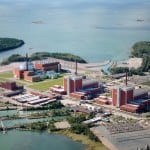A host of European countries have recently made concessions on long-standing nuclear policies. In February this year, for example, Sweden proposed to lift a nearly 30-year-old ban on nuclear power and annulled its nuclear phase-out. And in May 2008, Italy announced it would resume building nuclear plants—two decades after public referendum banned nuclear power and the nation deactivated all of its reactors.
The two countries—like Finland, France, and the UK—say that nuclear power would be an important source of electricity while they act on sustainable energy and climate policies. Only Belgium, Germany, and Spain remain committed to their nuclear phase-out policies. But that, too, could likely change—at least for Belgium and Germany.
Belgium’s seven nuclear reactors generate more than half its electricity, but government support for nuclear power has been sparse. In 1999, the government announced that reactor lifetimes would be limited to 40 years, and in January 2003, it passed an act prohibiting construction of new nuclear power plants.
A 2007 federal energy policy study recommended, however, that nuclear phase-out should be reconsidered and nuclear power factored into long-term energy plans in order to meet carbon reduction commitments—and for energy security and economic stability. This October, finally, a commission recommended a 10-year life extension for three of the oldest nuclear power reactors, to 2025, and a 20-year life extension for the other four. The government also postponed the phase-out by 10 years so that it does not begin until 2025.
But keeping nuclear power in Belgium will come at a hefty price for French utility GdF-Suez, which owns and operates all seven of the country’s nuclear reactors. Not only is the company is expected to spend €800 million to license the reactor life extensions, but it must also comply with a decision by the Belgian government that nuclear producers make an “annual contribution” of some €215 million to €245 million per year to the country’s budget over the period of 2010–2014—and more later.
Despite CEO Gerard Mestrallet’s prior protests that the company would not pay the levy, as it is about equivalent to the entire profit from the company’s Belgian nuclear operations, in October, the company also agreed to invest €500 million in renewable energy as part of a settlement regarding the nuclear tax.
Meanwhile, following the election of Germany’s center-right government this September, that country abandoned a commitment to setting a time limit of 2021 for phasing out nuclear power. The phase-out decision had been made almost a decade ago by the coalition of Social Democrats and Greens under Gerhard Schroeder’s chancellorship. The new government of Christian Democrats (CDU) and Free Democrats (FDP) opted instead to extend the life spans of Germany’s oldest nuclear power stations.
A public statement by new German Environment Minister Norbert Roettgen in late November indicated that an all-out nuclear revival for the country is highly unlikely, however. “We can only use nuclear power in the long-term if the majority of people accept it,” Roettgen said, adding that Germany’s long-standing antinuclear stance did not look like it would soon change.
The minister pointed out that the center-right coalition’s agreement was indistinct, saying only that the government was prepared to “extend the life-spans of German nuclear power stations within the strict guidelines of German and international safety standards.” He also noted that no negotiations for extensions had yet begun, though several prominent politicians had promised quick action. The most concrete decision by the government on the matter, he said, was to create a detailed concept for energy policy by October 2010.










